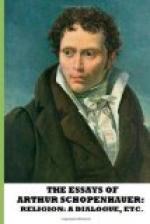ON BOOKS AND READING.
Ignorance is degrading only when found in company with riches. The poor man is restrained by poverty and need: labor occupies his thoughts, and takes the place of knowledge. But rich men who are ignorant live for their lusts only, and are like the beasts of the field; as may be seen every day: and they can also be reproached for not having used wealth and leisure for that which gives them their greatest value.
When we read, another person thinks for us: we merely repeat his mental process. In learning to write, the pupil goes over with his pen what the teacher has outlined in pencil: so in reading; the greater part of the work of thought is already done for us. This is why it relieves us to take up a book after being occupied with our own thoughts. And in reading, the mind is, in fact, only the playground of another’s thoughts. So it comes about that if anyone spends almost the whole day in reading, and by way of relaxation devotes the intervals to some thoughtless pastime, he gradually loses the capacity for thinking; just as the man who always rides, at last forgets how to walk. This is the case with many learned persons: they have read themselves stupid. For to occupy every spare moment in reading, and to do nothing but read, is even more paralyzing to the mind than constant manual labor, which at least allows those engaged in it to follow their own thoughts. A spring never free from the pressure of some foreign body at last loses its elasticity; and so does the mind if other people’s thoughts are constantly forced upon it. Just as you can ruin the stomach and impair the whole body by taking too much nourishment, so you can overfill and choke the mind by feeding it too much. The more you read, the fewer are the traces left by what you have read: the mind becomes like a tablet crossed over and over with writing. There is no time for ruminating, and in no other way can you assimilate what you have read. If you read on and on without setting your own thoughts to work, what you have read can not strike root, and is generally lost. It is, in fact, just the same with mental as with bodily food: hardly the fifth part of what one takes is assimilated. The rest passes off in evaporation, respiration and the like.
The result of all this is that thoughts put on paper are nothing more than footsteps in the sand: you see the way the man has gone, but to know what he saw on his walk, you want his eyes.
There is no quality of style that can be gained by reading writers who possess it; whether it be persuasiveness, imagination, the gift of drawing comparisons, boldness, bitterness, brevity, grace, ease of expression or wit, unexpected contrasts, a laconic or naive manner, and the like. But if these qualities are already in us, exist, that is to say, potentially, we can call them forth and bring them to consciousness; we




